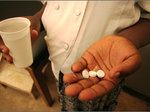Malaria drug resistance a potential 'global disaster'
1 April 2014

Malaria experts from the World Health Organization Western Pacific Region and key partners are reiterating a warning that anti-malarial drug resistance is an ever-growing challenge that needs to be tackled urgently.
Otherwise artemisinin based combination therapies (ACT), the most effective first line anti-malarial drug, could be rendered useless, reversing the very real gains that have been made in recent years in the fight against malaria.
This was a key issue discussed at a meeting in Sydney, Australia, earlier last week by members of the Access to Quality Medicines and other Technologies Taskforce (AQMTF), which advises the Asia Pacific Leaders Malaria Alliance (APLMA) on options for improving the availability of and access to quality medicines, diagnostics and other products through regional cooperation.
The Taskforce co-chaired by Secretaries of Health from Australia and India, voiced support for a global campaign to ban the use of oral based artemisinin monotherapies to treat malaria. Experts stressed that artemisinin must be used in combination with other anti-malarial medication to stop the malaria parasites from developing resistance to the drug.
The 'most powerful weapon in the battle against malaria'
The World Health Organization estimated that 207 million cases of malaria occurred in 2012 globally, resulting in 627 000 deaths. The majority of cases occurred in the African Region, particularly among children under five years of age. Of these, the Asia Pacific region alone witnessed an estimated 36 million malaria cases and around 49 000 deaths during the same period.
“Artemisinin, which has truly been a wonder drug, continues to be far too commonly used on its own for malaria treatment, accessed far too easily through private suppliers,” noted Dr Walter Kazadi, WHO Regional Hub Coordinator, Emergency Response to Artemisinin Resistance (ERAR) in the Greater Mekong Subregion. “Countries and health partners need to work on urgently to effectively ban monotherapies and help enforce such measures. Make no mistake – if artemisinin becomes ineffective, we will not only lose one of our most powerful weapons in the battle against malaria, it will be a global disaster.”
Who are the vulnerable populations?
“We must also ensure that people particularly vulnerable to malaria, including migrants and the poor, can better access preventive measures,” added Dr Klara Tisocki, Team Leader, Essential Medicines and Health Technologies at the WHO Regional Office for the Western Pacific.
“Further, once infected, people should be able to access the most effective combination treatment. We need to find better solutions to help strengthen supply chains, and use the ability of the private sector—not just the government health sector—to better deliver quality-assured medicines and anti-malarial products.”
WHO’s Regional Action Plan for Malaria Control and Elimination in the Western Pacific (2010–2015) includes the distribution of insecticide treated bed nets, effective mosquito control, strengthened diagnostics, better access to treatment, more robust surveillance of malaria, continual research into the disease, and the implementation of emergency response to artemisinin resistance in GMS countries.
Last week’s Taskforce meeting in Sydney included government representatives from 14 WHO Member States, along with experts from WHO, the Roll Back Malaria Initiative, the Global Fund to Fight AIDS, TB and Malaria, and the Asian Development Bank. The meeting was supported by the Asian Development Bank, with funding from the Australian aid programme administered by the Department of Foreign Affairs and Trade.
The Taskforce has agreed to meet again in June 2014, in Manila, Philippines, to finalize its recommendations before submitting a formal report to APLMA leaders in August 2014.

